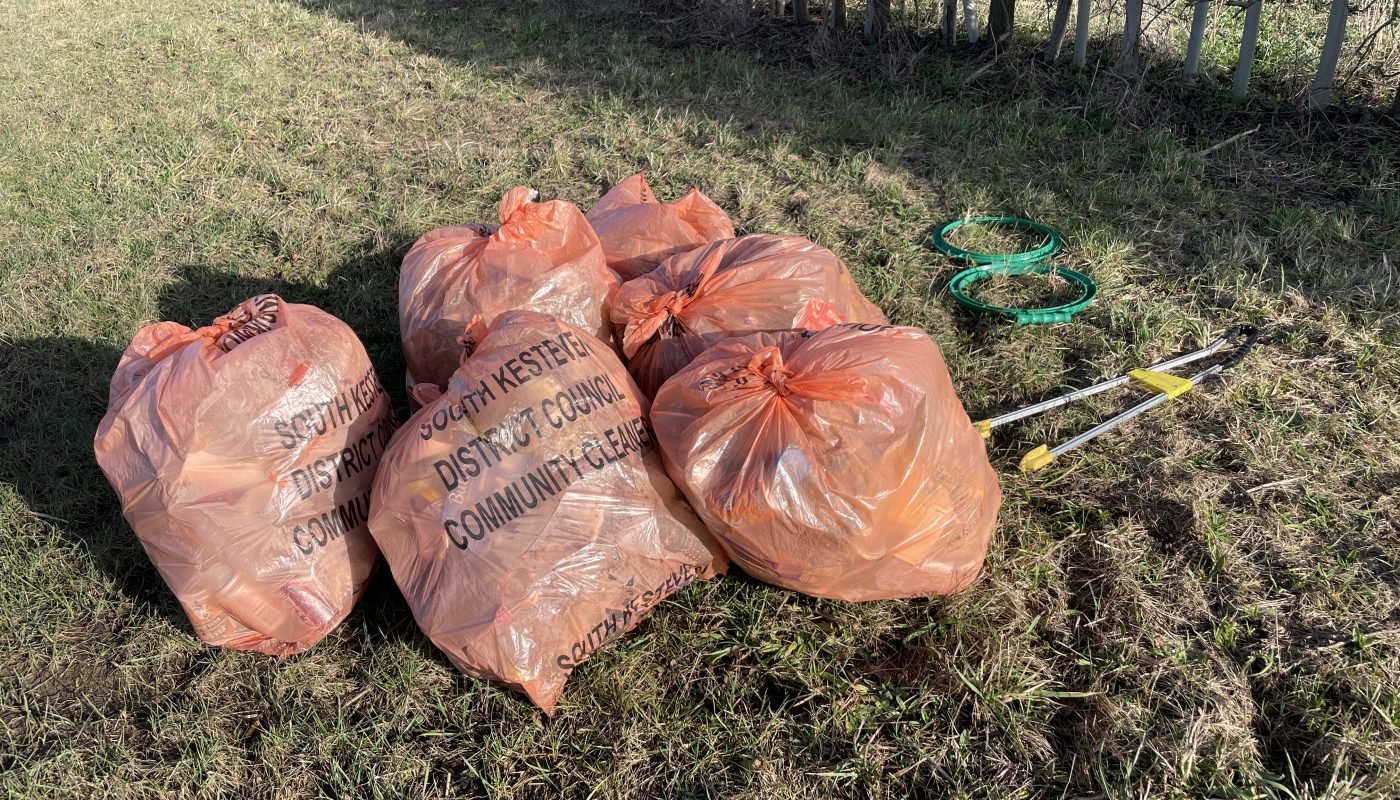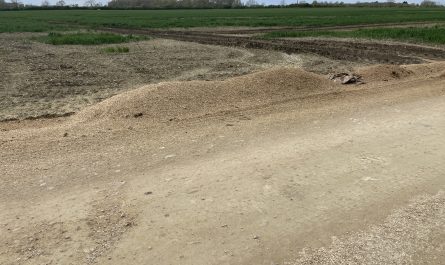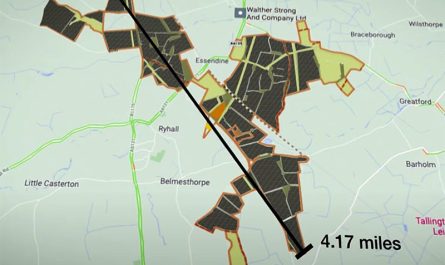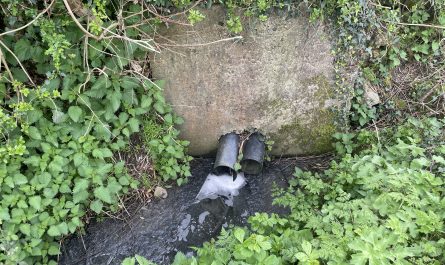EDIT (13 March 2024): Firstly, I have heard that a resident is unhappy about the Orange bags full of litter left near the telephone box for collection. Hopefully, this will be the last push for a while as I have cleared all the roads into Stubton recently. For information, it’s a great time of year to do this while the hedges and verges have all been cut back. However, I haven’t collected Clensey Lane for a while, but I know that someone in the village collects this one too! I do agree, the bags are unsightly, but it’s a trade off, human detritus or orange bags, choices?
I think the resident will be surprised at the amount of litter deposited on our verges. Last week on Brandon Road I collected SEVEN bags of litter plus TWO tyres (two bags were left near the Brandon end for collection as I did those on my bike). Leaving them in the village ensures collection and I do try to leave them stacked tidily. Interestingly, when I first collected on Brandon Road, we must have collected 60 Gin Bottles in one location………although Carlsberg is the most popular these days. Maybe Brandon Road, should be renamed Carlsberg Lane? 🙂 The real concern is DRUNK drivers!
It’s a just a shame people feel the need to litter, that’s the real problem.
I am sure some of you will have noticed the Orange bags elsewhere – Shire Lane, Stragglethorpe Lane (over 130 collected on Stragglethorpe alone). Below 48 bag s were left for collection outside our area this week (and yes I am mad, but if we can make the world a better place, I can only try).
Extract below from SKDC which contains useful information.
South Kesteven District Council can support voluntary litter picking by providing orange ‘community cleaner’ sacks to volunteers and arranging for the removal of waste collected
Individuals and groups acting as volunteer littler pickers can be exposed to a number of avoidable hazards. The following guidance has been produced to help volunteers identify these hazards, making their involvement safe and enjoyable and should be followed by all volunteers.
To contact the Council about any of the items raised in this guidance, request community cleaning sacks or to schedule the removal of collected litter, please call 01476 406080 or contact us.
LCC now offer kits, information is available on their website https://www.lincolnshire.gov.uk/recycling-waste/litter-picking/3
Protective Clothing and Equipment
Volunteers undertaking litter picks should use the following items at all times:-
- Reflective hi-visibility waistcoats to clearly highlight volunteers to highway traffic
- Litter Pickers to avoid contact with litter and repetitive bending
- Gloves to minimise contact with any noxious or dangerous materials. Any gloves provided by SKDC will be for hygiene use only and will not protect from sharp or hazardous materials.
- Suitable footwear / clothing (flip flops or other open toe footwear is not recommended)
Noxious and Dangerous Materials
The following materials may be encountered during litter picks and should be treated with caution:-
- Broken Glass – remove using a litter picker or a brush and shovel, avoiding contact by hand and dispose of in a sturdy container
- Drug Related Litter / Hypodermic Needles – these should not be moved. Note the location and report to the council at the earliest possible convenience for specialist removal
- Suspect Materials and Fly Tipping – items that are possibly dangerous such as unknown liquids in containers, building materials or asbestos should not be moved by volunteers. Again, note the location and report to the council for specialist removal
If there is any doubt about an item located on publicly accessible land, leave it and let the Council know.
General Site Safety and Inspection
Litter picking of areas beside roads should be carried out with extreme caution, due to the risk of being struck by vehicles; a pre-site inspection should determine an agreed, safe working area. Litter picking should be restricted to only where there are wide verges or pavements, suitable for pedestrians and should be carried out facing oncoming traffic. It is essential that volunteers are visible to road users, for that reason, hi-visibility waistcoats must be worn and litter picks should only take place in clear daylight. Volunteers should not attempt to clear litter from the carriageway.
Avoid reaching into hedges or undergrowth in such a way as to expose the face, eyes and skin to scratches from thorns and branches. If an item of litter can not be safely reached with a litter picker, leave it and report its location to the Council.
Avoid working close to rivers or on steep slopes, as there is an increased risk of slips and falls. When working close to ditches, avoid reaching into the ditch to remove litter, unless it can be safely reached with a litter picker.
Be mindful of wildlife. In the spring time avoid disturbing animals and birds that may be nesting and in the summer time be wary of wasp and bee nests.
Do not enter an area, or attempt to litter pick an area where works are restricted, are already taking place (e.g. road works) or where the public do not have a right of entry.
The level of risk will vary at each location, so prior to commencing a litter pick, it is recommended that a visual site inspection and risk assessment be carried out to establish the above risks and to identify and note other possible hazards. Volunteers have a duty towards themselves, fellow volunteers and the public to work safely. If there is any doubt about the safety of a site or material, then it should be avoided.
Lifting and Handling Materials
Volunteers should be aware of the risk of injury by carrying bags of collected litter and attempting to lift and carry heavy materials. To avoid injury, the following basic principals of manual handling should be applied:-
- Use litter pickers to prevent constant bending and stretching
- Make sure an item is safe to handle with no sharp edges or noxious contents
- Decide if an item can be safely moved either by one or two people
- Only try to move an item if this can be done so without straining
- When lifting an item, bend the legs and keep the back straight
Young Volunteers
While it is beneficial to get young people involved in the litter picks, age plays a big part in the ability to recognise and avoid risk. Accordingly, a parent or guardian should supervise those taking part under the age of 18, if a parent or guardian is not taking part with them then they will need to nominate an adult to supervise their children and give their permission for them to take part.
Collection and Disposal of Litter
Where larger quantities of litter are being collected, the Council can arrange for the litter collected to be disposed of after the event. Please contact the Customer Services Department on 01476 406080.
Recycling
Volunteers are not expected to separate recyclable items of litter, but if they are willing to do this, it would be welcomed. The recyclable items should be placed in clear recycling bags (where clean and acceptable) or taken to their nearest recycling point.
Disclaimer
Volunteers should not participate in litter picks unless they understand that participation is entirely at their own risk. Volunteers are not working for, or on behalf of, the Parish or South Kesteven District Council. Therefore the Council will not be held responsible for any loss, damage or inconvenience caused because of the actions and omissions of volunteers or this guidance.
Public Liability Insurance
Obtaining public liability insurance is very important and strongly recommended. This will provide cover for:
- your legal liability arising from accidental damage or injury that may occur during the event
- damage or injury to a member of the public or their property.
If you are an individual organising a tidy up, your current household insurance may cover you for public liability. You will need to check your policy to ensure you are covered. If not, you will need to take out separate public liability insurance.
Frequently Asked Questions
What is the difference between litter and fly tipping?
- Litter is generally considered to be waste associated with eating, drinking or smoking, which has been improperly discarded and left by members of the public, or waste that is split during business operations
- Fly-tipping is controlled waste (household, commercial, industrial or clinical waste) which has been dumped illegally rather than being disposed of correctly









